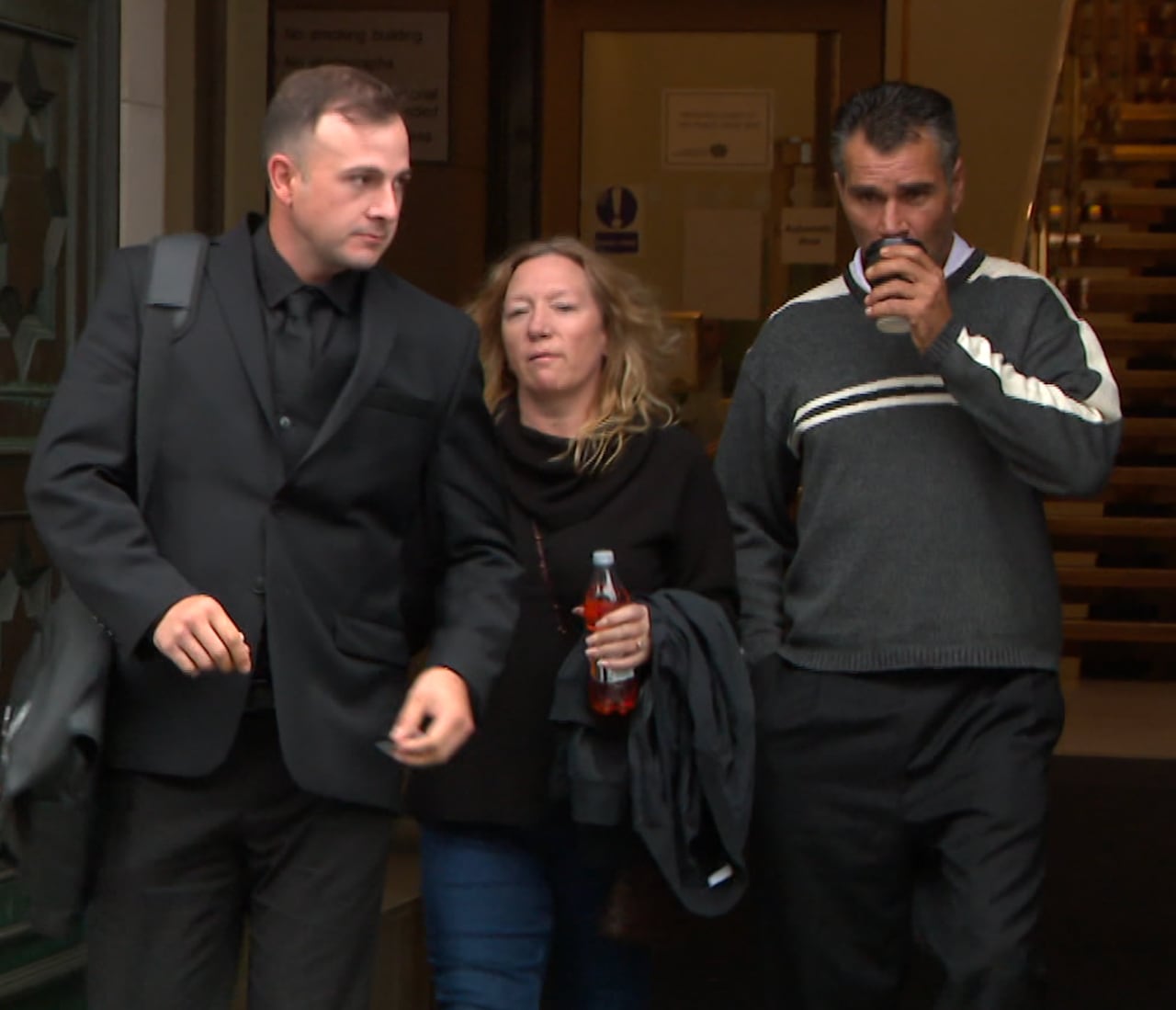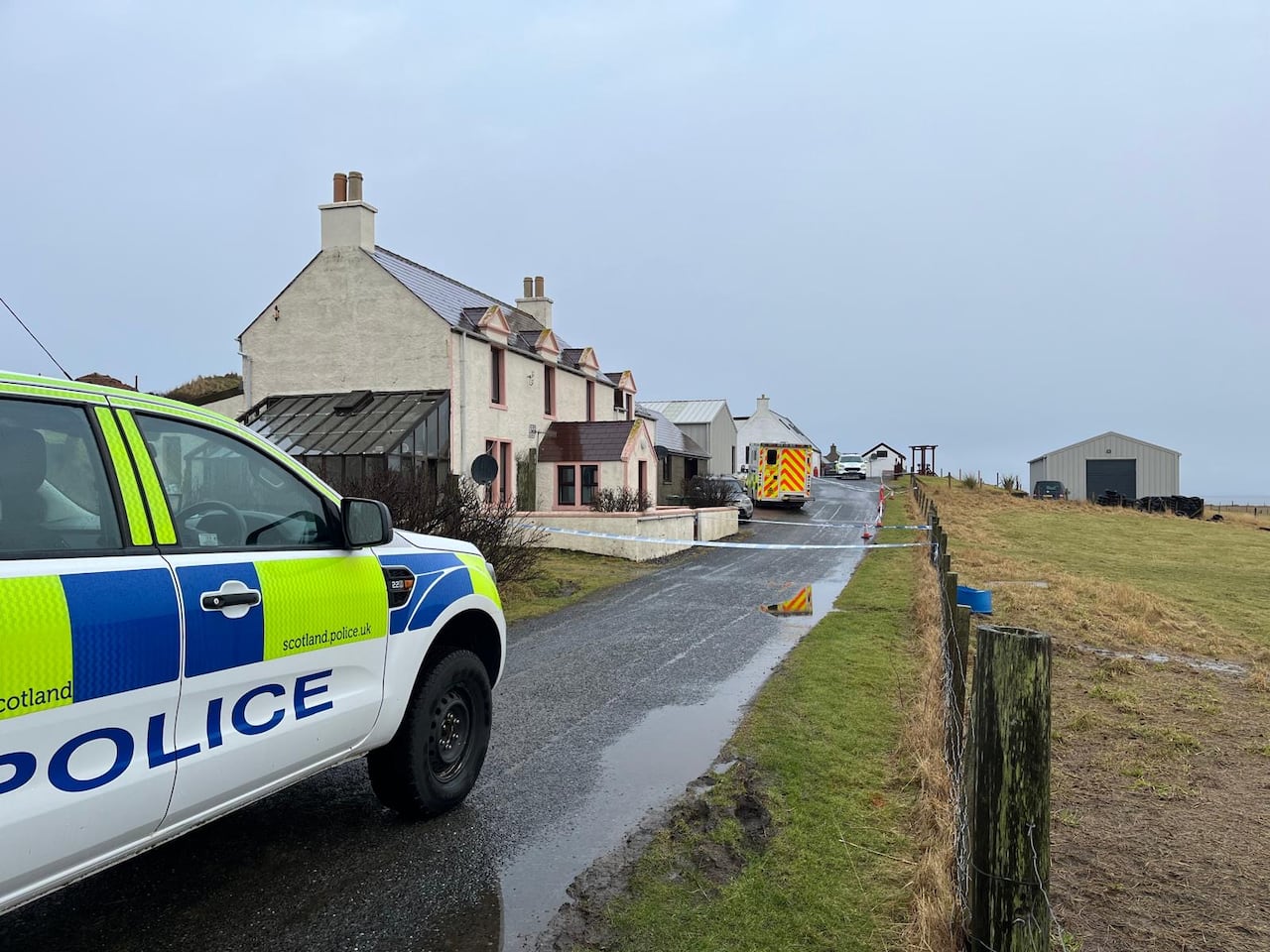WARNING: This article contains details of intimate partner violence and may affect those who have experienced that themselves or know someone who has.
A Scottish jury has convicted a man for killing his Canadian girlfriend in the remote Shetland Islands of Scotland, and a judge has ruled he must spend at least 25 years in prison.
Aren Pearson, 41, was found guilty Wednesday of assault and murder in the death of 24-year-old Claire Leveque, who was originally from Westlock, Alta., but had been living and working in Edmonton.
Five other charges, including attempting to defeat the ends of justice, were withdrawn.
In the U.K., a murder conviction carries a mandatory life sentence. Judge Paul Arthurson ruled Pearson must serve a minimum of 25 years before he can apply for parole.

“Thank you to everybody, to the detectives, to the Crown, to the judge, to the members of the jury who sat there and listened to all this intense evidence,” said Leveque’s cousin Hope Ingram outside court after sentencing. Ingram, who travelled from Edmonton to attend the trial and support her uncle, described herself and Leveque as being more like sisters than cousins.
“Today we were able to get justice for Claire and hopefully start a new path in helping other victims suffering from domestic violence in being able to move forward and come forward.”
Graphic details revealed in court
The couple met in Edmonton, and in 2023, they travelled to Sandness, a tiny community in the Shetland Islands, the latter of which has a regional population of roughly 23,000. The couple was living with Pearson’s mother at the time.
Pearson is Canadian citizen but told court he had applied for his U.K. citizenship and had received his U.K. passport days after Leveque’s death.
Crown prosecutor Margaret Barron told court the case rested on admissions Pearson made on Feb. 11, 2024, during a 48-minute recording of a 999 emergency call from a house in Sandness.

The main voice on the call was Pearson’s late mother, but court heard Pearson take the phone, identify himself and tell the operator that he had killed his girlfriend in a hot tub by stabbing her “more than 40 times,” including in the heart, stomach, face and neck, and that “I definitely killed her.”
Pearson’s mother told police detectives she saw Leveque in the hot tub covered in blood, with severe injuries to her face. As the judge noted Wednesday, Leveque was still alive at that time and Pearson’s mother heard her “groaning and moaning in the tub” and tried to pull her out.
She said her son was behaving like a “zombie” and had stabbed himself in the neck, consumed brake fluid and drove his Porsche into the North Sea.

One of the first police officers on the scene told court that Pearson said, “Murderers are to be killed … put a bullet in me.”
A physician who treated Pearson testified he told her, “I’ve been trying to get rid of her for a while.” A psychiatrist found Pearson showed no evidence of a mood disorder or psychotic illness.
Jurors also heard a six-minute audio recording of a conversation between the couple. In it, Leveque told Pearson that he hit her three times on her 24th birthday but that she still loved him, before adding, “You are going to kill me.”
Pearson testified in his own defence, saying the couple had a fight when Leveque heard him talking to her father about her alcohol consumption.

Under questioning by his lawyer, Iain Paterson, Pearson said Leveque was drinking whisky, lost her temper and struck him, then jumped into the hot tub and stabbed herself with a knife.
He claimed he was so shocked he couldn’t remember what happened next, but he denied strangling her or holding her head under water.
Court heard that during police questioning, Pearson was asked if he murdered Leveque. “To the best of my knowledge, no,” he replied.
Paterson told jurors the Crown did not prove its case beyond a reasonable doubt and so they must acquit his client.
“If he is lying, you might have expected him to come up with a better story,” he said in his closing speech.
Sentencing decision
The judge described the prosecution evidence as “substantial and compelling.” In contrast, he said Pearson’s evidence was a “malicious, vindictive, wholly fabricated account.”
Arthurson said Leveque died a “squalid death” of multi-faceted violence and a “sustained episode of feral butchery.”
Pearson has 14 days from the date of sentencing to lodge his intent to appeal the conviction, sentence or both. The Crown can also appeal the sentence if it feels it is unduly lenient.

In a statement following the verdict, Scotland Police Det. Insp. Richard Baird described the murder as “truly horrifying.”
“Our investigation uncovered evidence of a controlling and violent relationship with Claire Leveque, where Pearson sought to degrade and abuse her prior to her death,” he said.
“These actions and his actions after his violent attack, which led to her death show him as a cruel and selfish individual and it is right that he will now face the consequences of what he has done.”
While the verdict can’t change what happened, Baird said he hoped it will bring some closure to Leveque’s family.
‘We need to make sure that Claire is heard’
One of the first journalists to arrive on the crime scene in 2024, Louise Glen told CBC News that neighbours told her that Pearson seemed to isolate his girlfriend, who was rarely seen in the small, tight-knit community.
That Leveque was so “invisible” started to ring “alarm bells,” given that Pearson comes from a well-known family, said Glen, a crime and courts reporter for the Press and Journal newspaper.
She notes that some of the testimony at trial, including the Crown’s cross-examination of Pearson’s and the video showing the bloodied hot tub and Leveque’s body, left some jurors in tears.

“How can it possibly be that someone who is loved and cherished by her own family, who followed her dreams to come to one of the most beautiful places in the world, in Scotland, and yet meets her end with a man so callous that he films it and thinks that there is going to be no retribution for that?” she said Wednesday in an interview with CBC News.
Glen said she hopes this case increases awareness around intimate partner violence and the resources available. She notes that there have been questions about whether Leveque had access to her passport or money of her own.
“Here’s a woman who no longer has her voice,” she said. “We need to make sure that Claire is heard.”
In a statement, Shetland Women’s Aid said cases like this can be triggering for others, urging anyone upset by the details or experiencing similar violence to reach out.
“Everyone has the right to live free from violence, coercion and control,” the statement said. ”It devastates families, friends, and entire communities [and] reminds us why prevention, early education, and specialist support remain so vital.”

Remembering Leveque
Leveque’s remains were cremated and returned to her family. They will eventually be laid to rest beside her mother in Alberta.
Ingram said Leveque was a kind, open person with a “big personality.” She hopes people will remember her by her life – not her death.
“Claire was the kind of person that could make anybody laugh at any moment in time,” she said with a catch in her voice. “She was so light. She was so bubbly. She wanted to explore the world, and that is why she travelled out here to Scotland.”
Ingram said she will honor her cousin by living life to the fullest and making the most of every moment “because that’s what she would have done, and that’s what she would’ve wanted.”
If you’re in immediate danger or fear for your safety or that of others around you, please call 911. If you’re affected by family or intimate partner violence, you can look for help through crisis lines and local support services.
Source link






